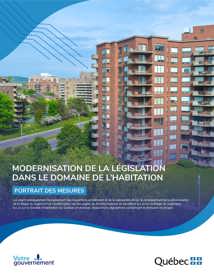Major reform of co-ownership law
Everything you need to know about the effects of Bill 16
In short

Quebec underwent its most significant reform in condominium law with the adoption of Bill 16 in 2019 (which followed another significant reform regarding condominium insurance).
This reform brought several important changes necessary to improve condominium management and ensure their sustainability.
We have gathered here all the important resources on the subject: stay informed about the latest developments, find answers to your questions, understand everything there is to know about this reform by browsing through this space.
WHAT'S COMING NEXT
The changes introduced in 2019 have affected almost every aspect of condominium law, but they haven't all come into force yet, and three key measures are still awaiting regulations to become applicable:
- a periodic review of the contingency fund by a professional;
- the introduction of a maintenance logbook in the condominium register.
These two measures are designed to ensure adequate financial planning for maintenance and necessary repairs to the building's common areas. The third measure involves :
- the production by the syndicate of an attestation on the condition of the co-ownership when selling a condo (fraction of co-ownership).
This attestation is designed to protect buyers by providing them with essential information on the financial and physical state of the co-ownership.
WHEN WILL IT COME INTO FORCE?
The most important step now is the publication of the regulations, which will specify, on one hand, the conditions under which the contingency fund study and the maintenance booklet must be produced, and on the other hand, the content of the certificate on the condition of the co-ownership.
For the majority of condominiums, the review of the contingency fund study and maintenance logbook must be obtained no later than three years after the bylaw comes into force (article 151 of the bill).
Note that this deadline does not apply to the attestation on the condition of the co-ownership. Providing this attestation will most probably be mandatory as soon as the by-laws come into force.
IS IT COMING SOON?
Impossible to say, only the government can answer this question. But the recent adoption of Bill 31 is an important step: the government has taken advantage of this housing bill to amend the new articles 1070.2 and 1071 of the Civil Code of Québec, and to provide that the obligations concerning the contingency fund study and the maintenance logbook may "vary depending on the characteristics of a building".
For more details, see the detailed sections on each of these topics below.
This section will be updated as soon as the content of the regulations is known.
The three big changes:
-
Maintenance Logbook
Under the new regulation, the syndicate will be obliged to set up and keep up to date a maintenance logbook for all buildings owned by the co-ownership.
What is the purpose of a maintenance logbook?
The maintenance logbook is a register of all repairs carried out or to be carried out on the co-ownership property, with details of costs, professionals involved, materials, dates, etc. It serves not only to document, but also to plan the interventions required to maintain the buildings owned by the co-ownership. Having an orderly, up-to-date maintenance logbook is the key to extending the life of your property.
Who can draw up a maintenance logbook?
For the moment, it's impossible to answer this question. Government regulation will have to identify the people who can draw up and keep up to date the maintenance logbook.
What should the maintenance logbook contain?
Once again, it's the government regulation that will specify the detailed contents of the maintenance logbook.
That being said, many building specialists already offer to set up a co-ownership maintenance logbook, which is generally divided into two main sections:
- "Planning" section: records intervention recommendations for each component of the condominium.
- "Archiving" section: records all interventions as they are carried out.
Consult the RGCQ's Directory of corporate members or the Directory of suppliers to find a supplier who can help you create your maintenance logbook.
When will it be mandatory to have a maintenance logbook?
To find out, we'll have to wait until the government regulations comes into force. From then on, Bill 16 has established that, for the majority of co-ownerships, the maintenance logbook will have to be obtained no later than three years after the regulations comes into force.
Law article regarding the establishment of the maintenance logbook:
1070.2 C.c.Q, as amended by Bill 31. Find it at the bottom of the page, in the "Law articles" tab of the "To go further" section.
-
Review of the Contingency Fund
Bill 16 introduced a requirement for a periodic review of the contingency fund. However, this obligation does not yet exist, and the frequency and other terms must first be determined by a regulation that the government has not yet produced.
What is the purpose of the contingency fund study?
The requirement for a contingency fund study is intended to put an end to the problems of poorly maintained co-ownerships, repeated special contributions, unrealistic budgets set by real estate developers and lack of equity between generations of condo buyers. The contingency fund study helps determine annual contributions to the contingency fund, based on the major repairs and replacements required in the common areas.
Who can conduct a contingency fund study?
The Civil Code stipulates that it will be up to the government to identify the professional orders whose members will be authorized to carry out a study.
However, it is reasonable to assume that at least engineers, architects and professional technologists will be able to carry out such studies.
How often must a contingency fund study be carried out?
Initially, the new section 1071 stipulated that the board of directors must obtain a study of the contingency fund every 5 years, but this obligation was removed with the amendments made to this section and adopted with the recent Bill 31. It is now stipulated that the frequency of the contingency fund study will be determined by government regulation, which may modulate this frequency "according to the characteristics of a building". These characteristics could be, for example, the number of units in the building, its components, its year of construction or any other characteristic likely to justify a modulation of the contingency fund study rules.
What should be included in the contingency fund study?
A contingency fund study is a systematic assessment of the long-term financial requirements for the maintenance, repair and replacement of the building's common elements. Here again, we must be cautious about its content, since it will have to be established by government regulation. That said, the contingency fund study is not a new practice, and professionals in the field have established standards of practice that are found in the vast majority of studies. In the absence of any legislation, the RGCQ had already taken the lead and established a standard for conducting these studies back in 2015, which established that the contingency fund study was based on two main components:
Firstly, a more or less exhaustive inventory of components must be carried out, depending on the building, which includes the theoretical useful life of each one, and secondly, an economic projection must be made based on the replacement values of the components. This projection will be used to determine the annuities required to ensure that the accumulated sums are sufficient to guarantee the building's longevity (section 1.2).
Consult the RGCQ's Directory of corporate members or the Directory of suppliers to find a professional to carry out your contingency fund study.
When will it be mandatory to have a contingency fund study performed?
To find out, we'll have to wait until the government regulation comes into force. From then on, Bill 16 has established that, for most co-ownerships, the contingency fund study will have to be obtained no later than three years after the regulation comes into force.
Law article regarding the mandatory study of the contingency fund:
1071 C.c.Q, as amended by Bill 31. You'll find it at the bottom of the page, in the "Law articles" tab of the "To go further" section.
-
Attestation on the Condition of the Co-Ownership
This attestation represents a necessary protection for first-time buyers, who will have the essential information they need to make a free and informed choice regarding their future property investment.
Who receives the attestation?
The attestation will be given to the person interested in buying a condo, i.e. the promisor-buyer. It's important to understand that this does not mean anyone who expresses an interest, but rather the person who has signed a preliminary contract with the co-owners, often referred to as a "Promise to purchase".
Please note, however, that the buyer is not expected to contact the syndicate directly to obtain the document.
Who requests it?
It is the co-owners who must apply to the syndicate to obtain the attestation, and the law gives the syndicate 15 days to produce it.
What does the attestation contain?
The content and form of the attestation will be established by government regulation. However, it is conceivable that the attestation will contain information on the common charges associated with the fraction for sale, the state of the co-ownership's finances, the budget, and so on;
When will it be mandatory to provide this attestation?
It will be compulsory to provide this certificate as soon as the by-laws establishing its form and content come into force.
Please note, however, that for new co-ownerships, the law stipulates that the attestation will only be compulsory once the transitional meeting has taken place, and a new board of directors has been appointed, following the promoter's loss of control over the syndicate.
Law article concerning the attestation of condition of the co-ownership:
1068.1C.c.Q. You'll find it at the bottom of the page, in the "Law articles" tab of the "To go further" section.
Activities and training
Watch online training sessions or consult the schedule for upcoming activities.
-

Colloquium: The Reform Of Co-ownership (French only)
March 28, 2020
Online
To watch on demand
Find out more
-

Maintenance Logbook and Contingency Fund Study (French only)
November 8, 2022
Webinar
To watch on demand
Find out more
To go further
-
Consult the guides and tools
-
Members only
Bill 16 at a glance
Lorem ipsum dolor sit amet consectetur adipiscing elit. Quisque faucibus ex sapien vitae pellentesque sem placerat. In id cursus mi pretium tellus duis convallis. Tempus leo eu aenean sed diam urna tempor. Pulvinar vivamus fringilla lacus nec metus bibendum egestas. Iaculis massa nisl malesuada lacinia integer nunc posuere. Ut hendrerit semper vel class aptent taciti sociosqu. Ad litora torquent per conubia nostra inceptos himenaeos.
-
Modernization of legislation in the housing sector (French only)
Le projet de loi 16 a été adopté le 5 décembre 2019 à l’Assemblée nationale. Cette loi, sanctionnée le 11 décembre, permettra entre autres d’améliorer la réglementation de la copropriété divise et d’établir une certification reconnaissant la qualification des inspecteurs en bâtiment. La mise en œuvre des mesures s’étalera sur une période d’un an à trois ans. Pour en savoir davantage, nous vous invitons à consulter télécharger cette brochure.
-
Members only
Penalty clause (French only)
Lorem ipsum dolor sit amet consectetur adipiscing elit. Quisque faucibus ex sapien vitae pellentesque sem placerat. In id cursus mi pretium tellus duis convallis. Tempus leo eu aenean sed diam urna tempor. Pulvinar vivamus fringilla lacus nec metus bibendum egestas. Iaculis massa nisl malesuada lacinia integer nunc posuere. Ut hendrerit semper vel class aptent taciti sociosqu. Ad litora torquent per conubia nostra inceptos himenaeos.
-
Members only
Standardized accounting charter (French only)
Lorem ipsum dolor sit amet consectetur adipiscing elit. Quisque faucibus ex sapien vitae pellentesque sem placerat. In id cursus mi pretium tellus duis convallis. Tempus leo eu aenean sed diam urna tempor. Pulvinar vivamus fringilla lacus nec metus bibendum egestas. Iaculis massa nisl malesuada lacinia integer nunc posuere. Ut hendrerit semper vel class aptent taciti sociosqu. Ad litora torquent per conubia nostra inceptos himenaeos.
-
Login to view this content
Become a member
Access all our services and a vast network of experts by becoming a member of the RGCQ.





